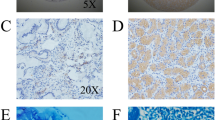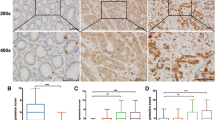Abstract
Backgrounds and Aims
Although Helicobacter pylori is widely accepted as a causative factor of many gastric diseases, the signaling pathways affected by H. pylori and subsequent effects on cell apoptosis and proliferation remain unclear. Here, we investigated the molecular mechanisms mediating H. pylori infection in gastric epithelial cells.
Methods
Tissues from 160 patients with various gastric diseases with or without H. pylori infection were obtained and analyzed by immunohistochemistry for Akt, pAkt, Mdm2, p53, and Bax expression. In vitro, human gastric epithelial cells, GES-1, were incubated with H. pylori culture filtrates. Cell viability was measured by MTT assay. Apoptosis was evaluated by Annexin V/PI double staining followed by flow cytometry, DNA electrophoresis, and comet assay. mRNA and protein expression was assessed by RT-PCR and Western blot analysis.
Results
In patient tissues, H. pylori infection was associated with significantly elevated levels of pAkt in chronic nonatrophic gastritis (CNAG), Mdm2 in dysplasia, p53 in metaplastic atrophy (MA), and Bax in CNAG and MA. In vitro, H. pylori culture filtrates reduced GES-1 cell viability in a time- and dose-dependent manner, induced G0/G1 arrest, triggered apoptosis, and increased DNA fragmentation. Mdm2 and Bax mRNA expression and pAkt, Mdm2, p53, and Bax protein expression were significantly upregulated when treated with H. pylori culture filtrates. Akt inhibition by LY294002 decreased Mdm2 expression, upregulated p53, and enhanced H. pylori-induced growth inhibition of GES-1 cells.
Conclusions
These findings suggest that Akt–Mdm2–p53 signaling is involved in the molecular response of GES-1 cells to H. pylori infection.






Similar content being viewed by others
References
Misiewicz JJ. Management of Helicobacter pylori-related disorders. Eur J Gastroenterol Hepatol. 2012;9:S17–S20. (discussion S20-11).
Polk DB, Peek RM Jr. Helicobacter pylori: gastric cancer and beyond. Nat Rev Cancer. 2010;10:403–414.
Lynch DA, Mapstone NP, Clarke AM, et al. Cell proliferation in Helicobacter pylori associated gastritis and the effect of eradication therapy. Gut. 1995;36:346–350.
Li N, Han L, Chen J, Lin X, Chen H, She F. Proliferative and apoptotic effects of gastric epithelial cells induced by coccoid Helicobacter pylori. J Basic Microbiol. 2013;53:147–155.
Saadat I, Higashi H, Obuse C, et al. Helicobacter pylori CagA targets PAR1/MARK kinase to disrupt epithelial cell polarity. Nature. 2007;447:330–333.
Ding SZ, Minohara Y, Fan XJ, et al. Helicobacter pylori infection induces oxidative stress and programmed cell death in human gastric epithelial cells. Infect Immun. 2007;75:4030–4039.
Calvino-Fernandez M, Benito-Martinez S, Parra-Cid T. Oxidative stress by Helicobacter pylori causes apoptosis through mitochondrial pathway in gastric epithelial cells. Apoptosis. 2008;13:1267–1280.
Mayo LD, Donner DB. The PTEN, Mdm2, p53 tumor suppressor-oncoprotein network. Trends Biochem Sci. 2002;27:462–467.
Feng Z, Lin M, Wu R. The regulation of aging and longevity: a new and complex role of p53. Genes Cancer. 2011;2:443–452.
Harris SL, Levine AJ. The p53 pathway: positive and negative feedback loops. Oncogene. 2005;24:2899–2908.
Stambolic V, MacPherson D, Sas D, et al. Regulation of PTEN transcription by p53. Mol Cell. 2001;8:317–325.
Singh B, Reddy PG, Goberdhan A, et al. p53 regulates cell survival by inhibiting PIK3CA in squamous cell carcinomas. Genes Dev. 2002;16:984–993.
Wei J, Nagy TA, Vilgelm A, et al. Regulation of p53 tumor suppressor by Helicobacter pylori in gastric epithelial cells. Gastroenterology. 2010;139:1333–1343.
Zhang Z, Yuan Y, Gao H, Dong M, Wang L, Gong YH. Apoptosis, proliferation and p53 gene expression of H. pylori associated gastric epithelial lesions. World J Gastroenterol. 2001;7:779–782.
Zhang ZW, Patchett SE, Farthing MJ. Role of Helicobacter pylori and p53 in regulation of gastric epithelial cell cycle phase progression. Dig Dis Sci. 2002;47:987–995.
Yang Z, Shu X, Chen L, Chen J, Xie Y, Lu NH. Expression of p53-MDM2 feedback loop related proteins in different gastric pathologies in relation to Helicobacter pylori infection: implications in gastric carcinogenesis. Clin Res Hepatol Gastroenterol. 2012;36:235–243.
Hamilton SRAL. Pathology and genetics of tumours of the digestive system. In: World Health Organization classification of tumors. Lyon: IARCP; 2000.
Dixon MF, Genta RM, Yardley JH, Correa P. Classification and grading of gastritis. The updated Sydney System. International Workshop on the Histopathology of Gastritis, Houston 1994. The Am J Surg Pathol. 1996;20:1161–1181.
Olive PL, Banath JP. The comet assay: a method to measure DNA damage in individual cells. Nat Protoc. 2006;1:23–29.
Sasaki T, Kuniyasu H, Luo Y, et al. Increased phosphorylation of AKT in high-risk gastric mucosa. Anticancer Res. 2013;33:3295–3300.
Kodama M, Fujioka T, Murakami K, et al. Eradication of Helicobacter pylori reduced the immunohistochemical detection of p53 and MDM2 in gastric mucosa. J Gastroenterol Hepatol. 2005;20:941–946.
Nakajima N, Ito Y, Yokoyama K, et al. The expression of murine double minute 2 (MDM2) on Helicobacter pylori-infected intestinal metaplasia and gastric cancer. J Clin Biochem Nutr. 2009;44:196–202.
Kodama M, Murakami K, Okimoto T, Sato R, Watanabe K, Fujioka T. Expression of mutant type-p53 products in H. pylori-associated chronic gastritis. World J Gastroenterol. 2007;13:1541–1546.
Unger Z, Molnar B, Pronai L, Szaleczky E, Zagoni T, Tulassay Z. Mutant p53 expression and apoptotic activity of Helicobacter pylori positive and negative gastritis in correlation with the presence of intestinal metaplasia. Eur J Gastroenterol Hepatol. 2003;15:389–393.
Obst B, Wagner S, Sewing KF, Beil W. Helicobacter pylori causes DNA damage in gastric epithelial cells. Carcinogenesis. 2000;21:1111–1115.
Kuribayashi K, Finnberg N, Jeffers JR, Zambetti GP, El-Deiry WS. The relative contribution of pro-apoptotic p53-target genes in the triggering of apoptosis following DNA damage in vitro and in vivo. Cell Cycle. 2011;10:2380–2389.
Bartchewsky W Jr, Martini MR, Squassoni AC, et al. Effects of Helicobacter pylori infection on the expressions of Bax and Bcl-2 in patients with chronic gastritis and gastric cancer. Dig Dis Sci. 2010;55:111–116.
Wei J, O’Brien D, Vilgelm A, et al. Interaction of Helicobacter pylori with gastric epithelial cells is mediated by the p53 protein family. Gastroenterology. 2008;134:1412–1423.
Soond SM, Carroll C, Townsend PA, et al. STAT1 regulates p73-mediated Bax gene expression. FEBS Lett. 2007;581:1217–1226.
Yan YG, Zhao G, Ma JP, Cai SR, Zhan WH. Effects of different Helicobacter pylori culture filtrates on growth of gastric epithelial cells. World J Gastroenterol. 2008;14:3745–3749.
Nagy TA, Frey MR, Yan F, Israel DA, Polk DB, Peek RM Jr. Helicobacter pylori regulates cellular migration and apoptosis by activation of phosphatidylinositol 3-kinase signaling. J Infect Dis. 2009;199:641–651.
Handa O, Naito Y, Yoshikawa T. CagA protein of Helicobacter pylori: a hijacker of gastric epithelial cell signaling. Biochem Pharmacol. 2007;73:1697–1702.
Takahashi K, Miyashita M, Makino H, et al. Expression of Akt and Mdm2 in human esophageal squamous cell carcinoma. Exp Mol Pathol. 2009;87:42–47.
Vivanco I, Sawyers CL. The phosphatidylinositol 3-kinase AKT pathway in human cancer. Nat Rev Cancer. 2002;2:489–501.
Lee JS, Cho JY, Song H, Kim EH, Hahm KB. Revaprazan, a novel acid pump antagonist, exerts anti-inflammatory action against Helicobacter pylori-induced COX-2 expression by inactivating Akt signaling. J Clin Biochem Nutr. 2012;51:77–83.
Nogueira V, Park Y, Chen CC, et al. Akt determines replicative senescence and oxidative or oncogenic premature senescence and sensitizes cells to oxidative apoptosis. Cancer Cell. 2008;14:458–470.
Acknowledgments
This work was supported by the National Natural Science Foundation of China (Nos. 81160058, 30660067) and Natural Science Foundation of Jiangxi Province (No. 20114BAB205019).
Conflict of interest
None.
Author information
Authors and Affiliations
Corresponding authors
Additional information
Xu Shu and Zhen Yang have contributed equally to this work.
Rights and permissions
About this article
Cite this article
Shu, X., Yang, Z., Li, ZH. et al. Helicobacter pylori Infection Activates the Akt–Mdm2–p53 Signaling Pathway in Gastric Epithelial Cells. Dig Dis Sci 60, 876–886 (2015). https://doi.org/10.1007/s10620-014-3470-2
Received:
Accepted:
Published:
Issue Date:
DOI: https://doi.org/10.1007/s10620-014-3470-2




